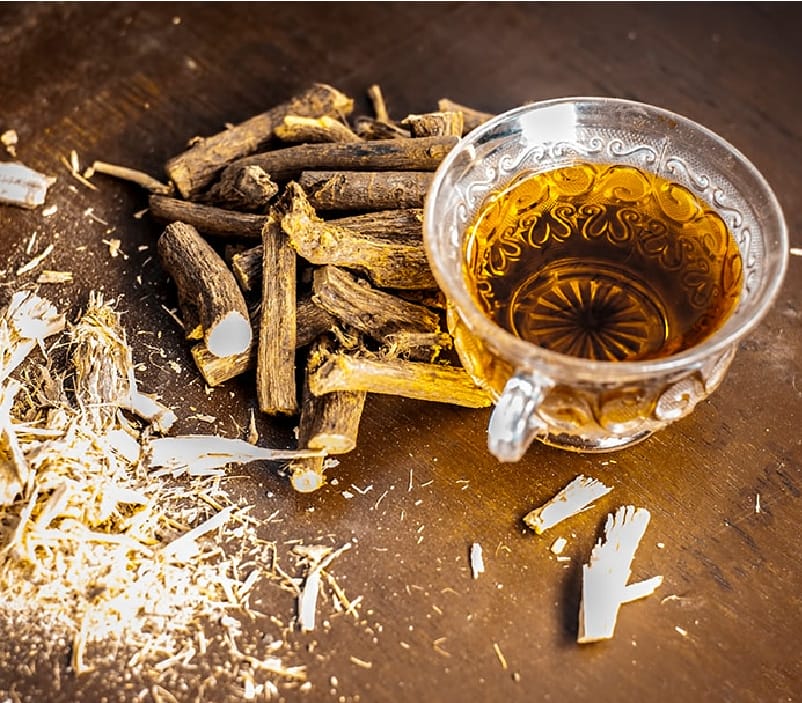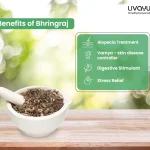
Yashtimadhu or mulethi is commonly known as licorice, a shrub native to the Mediterranean and central Asia. The Sanskrit name of Glycyrrhiza glabra is Yashtimadhu. Yashtimadhu benefits are many and since ages, it has been used medically for treating conditions like digestive conditions, cough, infection, sore throat and others.
Nutritional Value of Mulethi [1]
|
Constituents |
Amount per 100 gm |
|
Water |
6.3gm |
|
Energy |
375kcal |
|
Fat |
0.05g |
|
Fiber |
0.2gm |
|
Sugar |
70gm |
|
Calcium |
3mg |
|
Iron |
0.13mg |
|
Magnesium |
2mg |
What are the benefits of Yashtimadhu?
In Greek, “glykos” means sweet, and “rhiza” means root. Glycyrrhiza glabra is a shrub of the Fabaceae family. It is commonly known as mulethi or jethimadhu. It is native to the southern, central and Mediterranean Russia, and Asia. The plant is cultivated in subtropical climates and grows about 6 feet in height. It has long compound leaves bearings leaflets, spikes with lilac-colored flowers with bean-like pods having three to four seeds.
In the ancient history of Ayurveda, Yashtimadhu benefits have been mentioned, and is one of the most widely used medicinal herbs. The roots of the plant are mostly used for medicinal purpose. It is used for curing several conditions like anemia, sore throat, cough, fever, diarrhea, and others.
What are the benefits of Glycyrrhiza glabra?
Yashtimadhu plant can be used to treat the following conditions:
Respiratory conditions:
- Yashtimadhu plant is effective in curing respiratory diseases like bronchitis, asthma, chronic bronchitis, chest congestion, sore throat, and whooping cough.
- It has demonstrated a soothing effect on the throat and pharynx. Therefore, it is also effective in treating hoarseness of the voice.
Gastrointestinal disorders:
- The roots of the Yashtimadhu plant aids in supporting the digestive system by lowering the acidic levels in the intestine.
- It is effective in curing conditions like indigestion, peptic ulcers, duodenal ulcers, gastritis, irritable bowel syndrome, and heartburn.
Liver condition:
- The Yashtimadhu plant enhances the bile secretion in the liver and maintains the health of the liver.
- It is also lower down the cholesterol level in the body.
Thyroid disorder:
- Yashtimadhu plant helps in increasing the secretion of thyroid hormone. Thus is effective in curing hypothyroidism.
- It also aids in managing the hormonal balance of the body.
Prostate enlargement:
- The root extract of the herb prevents the conversion of testosterone into dihydrotestosterone that is responsible for the increase in the size of the prostate gland.
- Therefore, it is effective in reducing the size of the prostate gland and managing the associated symptoms.
Body infections:
- The herb contains antimicrobial and antifungal property.
- It enhances the immune system and ability of the body to fight against bacterial and viral infection. It is also effective in treating athlete’s foot.
Allergic reactions:
- The herb boosts the immune system and aids in curing different types of allergic reactions.
Eczema:
- The herb when directly applied to the skin improves the symptoms of eczema.
What are the medicinal properties of Yashtimadhu?
Yashtimadhu benefits are many. Studies have demonstrated the following medicinal properties of Yashtimadhu:
- Antioxidant property
- Anti-tussive and expectorant property
- Skin lightening and skin tightening activity
- Anti-inflammatory property
- Anti-viral property
- Anti-fungal property
- Anti-bacterial property
- Anti-malarial property
- Antihyperglycemic property
- Immunostimulatory effects
- Memory enhancing activity
- Hepatoprotective activity
- Anticoagulant
- Hair growth stimulator
What are the side effects of Mulethi?
Mulethi is usually harmless if consumed in recommended doses. Consuming a large amount of Mulethi for long term may lead to certain side effects, such as:
- Weakness
- Paralysis
- Low potassium levels
- High blood pressure
- Tiredness
- Absence of menstrual period
- Headache
- Water and sodium retention
- Decreased sexual interest
- Nausea
- Vomiting
Using Yashtimadhu safely
The recommended dose of Yashtimadhu is 1 to 4 grams per day. However, the dose may vary depending on the person’s age and health condition. Individuals with the following conditions should avoid consuming Yashtimadhu:
- Pregnancy: Pregnant women should avoid consuming Yashtimadhu as it may lead to early delivery or miscarriage.
- High blood pressure: Yashtimadhu may raise blood pressure. Therefore, individuals with high blood pressure should avoid taking the herb.
- Hormone-sensitive condition: The herb may act like estrogen and worsen conditions like breast cancer, ovarian cancer, uterine cancer, uterine fibroids, and endometriosis.
- Hypertonia: Yashtimadhu lower down the potassium level in the blood and may worsen the condition.
Undergoing surgery: A person should avoid consuming Yashtimadhu at least 2 weeks before the planned surgery as it may interfere with the blood pressure control.
Interaction of Yashtimadhu with Other Medications or Supplements [3]
Yashtimadhu may interact with certain medications or supplements, potentially affecting their efficacy or increasing the risk of side effects. It may interact with medications that affect blood sugar levels, potentially altering their effectiveness. It’s essential to consult with a healthcare provider before combining Yashtimadhu with other treatments to avoid any adverse interactions.
Disclaimer
This article is from a health and wellness perspective only and does not constitute medical advice. Kindly seek the help of a trained medical practitioner before initiating any treatment.
The Final Takeaway
Mulethi has been utilized for thousands of years to address various health issues, including respiratory conditions and digestive troubles. Its plant compounds exhibit strong antioxidant, anti-inflammatory, and antimicrobial properties. While Yashtimadhu plant uses may help alleviate acid reflux, eczema, peptic ulcers, and other concerns, it is important to consult your healthcare provider before using it.
References:
- https://fdc.nal.usda.gov/fdc-app.html#/food-details/1104076
Using Yashtimadhu safely
The recommended dose of Yashtimadhu is 1 to 4 grams per day. However, the dose may vary depending on the person’s age and health condition. Individuals with the following conditions should avoid consuming Yashtimadhu:
- Pregnancy: Pregnant women should avoid consuming Yashtimadhu as it may lead to early delivery or miscarriage.
- High blood pressure: Yashtimadhu may raise blood pressure. Therefore, individuals with high blood pressure should avoid taking the herb.
- Hormone-sensitive condition: The herb may act like estrogen and worsen conditions like breast cancer, ovarian cancer, uterine cancer, uterine fibroids, and endometriosis.
- Hypertonia: Yashtimadhu lower down the potassium level in the blood and may worsen the condition.
Undergoing surgery: A person should avoid consuming Yashtimadhu
Using Yashtimadhu safely
The recommended dose of Yashtimadhu is 1 to 4 grams per day. However, the dose may vary depending on the person’s age and health condition. Individuals with the following conditions should avoid consuming Yashtimadhu:
- Pregnancy: Pregnant women should avoid consuming Yashtimadhu as it may lead to early delivery or miscarriage.
- High blood pressure: Yashtimadhu may raise blood pressure. Therefore, individuals with high blood pressure should avoid taking the herb.
- Hormone-sensitive condition: The herb may act like estrogen and worsen conditions like breast cancer, ovarian cancer, uterine cancer, uterine fibroids, and endometriosis.
- Hypertonia: Yashtimadhu lower down the potassium level in the blood and may worsen the condition.
- Pharmacokinetic Interactions of a Licorice Dietary Supplement with Cytochrome P450 Enzymes in Female Participants, 2023
- A review on phytochemicals, pharmacological activities, drug interactions, and associated toxicities of licorice ( Glycyrrhiza sp.)
1. Is mulethi good for the throat?
Yashtimadhu is beneficial for soothing sore throats, alleviating throat irritation, and treating coughs and bronchitis, thanks to its healing and expectorant properties.
2. Is mulethi good for dry cough?
Mulethi’s expectorant and bronchodilator properties are effective in managing conditions such as whooping cough, asthma, dry cough, and bronchitis.
3. Can we consume mulethi daily?
Consuming Yashtimadhu in moderate amounts daily is generally safe for most people. However, excessive intake may lead to side effects such as high blood pressure, potassium loss, and electrolyte imbalances.
4. Is mulethi good for acidity?
Mulethi can be combined with ginger to make tea, which helps manage issues such as hyperacidity, stomach ulcers, and mouth ulcers.





















